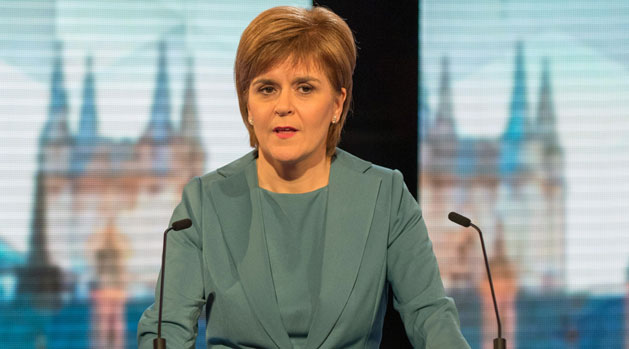SNP manifesto 2015: Nicola Sturgeon's policies
Scottish nationalists want to scrap Trident, reduce university tuition fees and block welfare cuts

A free daily email with the biggest news stories of the day – and the best features from TheWeek.com
You are now subscribed
Your newsletter sign-up was successful
Scotland's First Minister Nicola Sturgeon is not contesting the 2015 general election, but her party may well hold the balance of power with 50 or more MPs.
In their manifesto, the Scottish nationalists offer an "alternative" to austerity, with proposals for real-term spending increases of 0.5 per cent a year. They claim this would free up resources for investment in jobs, economic growth and public services. It also commits SNP MPs to take part in votes on major issues south of the border, including repealing the 2012 Health and Social Care Act.
"For perhaps the first time, the SNP have proved our complete relevance to a Westminster general election," said one senior SNP campaign source.
The Week
Escape your echo chamber. Get the facts behind the news, plus analysis from multiple perspectives.

Sign up for The Week's Free Newsletters
From our morning news briefing to a weekly Good News Newsletter, get the best of The Week delivered directly to your inbox.
From our morning news briefing to a weekly Good News Newsletter, get the best of The Week delivered directly to your inbox.
The Daily Telegraph claims the party is looking at whether it could block defence spending to ensure that there is no renewal of Trident. However, Philip Cowley, a professor of parliamentary government at Nottingham University, says this could only happen if SNP was willing to vote with the Conservatives against a Labour budget.
The Tories, Labour and the Liberal Democrats have all supported the renewal of Britain's nuclear deterrent.
Other SNP proposals include backing infrastructure projects, including HS2; supporting the recognition of a Palestinian state; moves to block Conservative welfare changes; and supporting cuts to tuition fees.
Here's what else the SNP is promising in its manifesto:
A free daily email with the biggest news stories of the day – and the best features from TheWeek.com
Economy
Spending would be increased by "a modest" 0.5 per cent above inflation each year, enabling at least £140bn additional investment in the economy and public services. The deficit and the national debt would still fall each year but at a slightly slower rate compared with the current Coalition plan.
Tax
The 50p top income tax would be restored for those earning more than £150,000. A mansion tax, a bankers' bonus tax and a bank levy would also be introduced. Non-dom status and married couple's tax allowance would be abolished, with a crackdown on tax avoidance.
Business and employment
SNP would back a minimum wage increase to £8.70 by 2020 and an increase in the Employment Allowance from £2,000 to £6,000 per business per year, to help smaller firms take on and retain additional staff.
Families and housing
The party supports Help to Buy and the target of 100,000 new affordable homes a year in the UK. It also supports an increase in free childcare up to 30 hours per week by 2020.
Health
Health spending will be increased across the UK by a total of £24bn by 2020/21. SNP will also vote against any further privatisation of the NHS in England and back any moves to restore it to a "fully public service".
Education
The party will continue free university education in Scotland and support the reduction of tuition fees across the rest of the UK.
Immigration and the EU
SNP opposes a referendum on membership of the UK. If one goes ahead, it will seek legislation to ensure that England, Scotland, Wales and Northern Ireland will all have to vote 'out' before the UK can leave. It will support "sensible" immigration policies that meet the country's economic needs.
Security and defence
The party will seek to build an "alliance" in the Commons against the renewal of Trident – with the savings spent on education, childcare and the NHS – and wants a higher proportion of the UK's defence budget spent in Scotland.
Benefits
Sturgeon's party supports the winter fuel allowance and pensions triple-lock – ensuring that the basic state pension will always rise in line with earnings, inflation or 2.5 per cent, whichever is higher – but opposes the bedroom tax and cuts to disability support. It will also oppose plans for further cuts to child benefit and tax credits, and supports an increase in benefits, at least in line with CPI inflation, as well as an increase in carer's allowance so that it matches jobseeker's allowance.
Government
The party will use the influence of SNP votes at Westminster to ensure that the Scottish referendum pledges of devolution are delivered. It also wants Scottish Parliament to have full financial responsibility, with initial devolution of powers over employment policy, including minimum wage, welfare, business taxes, national insurance and equality policy. SNP wants to abolish the House of Lords and replace the first-past-the-post voting system with proportional representation.
Extras
The UK government will be requested to adopt Scotland's ambitious carbon reduction targets. SNP supports a moratorium on fracking and 50:50 representation for men and women on public and private boards. The party is also threatening to vote in a motion of confidence against a Tory government if the 7 May election results in an "anti-Tory majority" in the House of Commons.